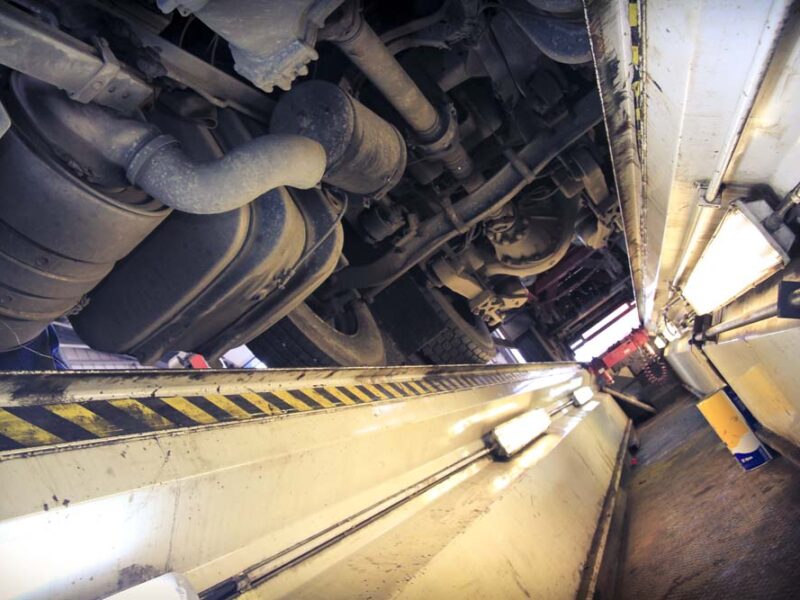In early August 2023, the Driver & Vehicles Standards Agency ('DVSA') posted a bulletin regarding statutory testing of Hydrogen powered vehicles.
What are Hydrogen Powered Vehicles?
As the name suggests, these are vehicles powered by hydrogen. The vehicle uses a process known as 'reverse electrolysis' which takes place in a fuel cell within the vehicle. The hydrogen gas comes from one or more tanks in the vehicle, similar to a normal petrol/diesel tank, while the second gas, needed to complete the process of reverse electrolysis, oxygen, is obtained from the ambient air. The key benefit of hydrogen powered vehicles is that the reaction produces energy (in the form of electricity) to power the vehicle but no harmful (local) emissions are released from the vehicles exhaust system, making them relatively clean vehicles for use in urban areas, where the quality of air and the effect of diesel emissions has become a political hot potato in recent years.
Hydrogen Fuel Cell vehicles as they are correctly called are classified as "e-vehicles" by the DVSA but because of their need to take on-board hydrogen gas they also fall under "gas vehicles" such as Compressed Natural Gas (CNG), Liquefied Natural Gas (LNG) and Liquefied Petroleum Gas (LPG) vehicles which means that they must be "leak free" before entering the DVSA statutory test premises.
The DVSA's Response
Whilst the DVSA states that it understands that these vehicles are still very new and not widely used yet, they will still expect the drivers of these vehicles to be familiar with the basic hydrogen systems. When the vehicles are presented at a DVSA facility for statutory testing, the requirement is that the vehicle will be leak free and that the drivers will know how to confirm that fact before being allowed to enter the facility. DVSA personnel will be asking all drivers of Hydrogen Fuel Cell vehicles to demonstrate this capability before granting access.
It is therefore crucial that full training and information is given to any driver who will be driving hydrogen vehicles to ensure that they know how to fuel the vehicles correctly as well as how to check that the vehicle is safe and "leak free". Although hydrogen gas is less explosive when compared to petrol (petrol can be explosive at oxygen concentrations of between just 1 and 3%, but being a liquid it is easier to contain) when it is mixed with oxygen in the air it has a very "broad flammability range" of between 4 - 75%. Hence the need to ensure that hydrogen and oxygen are kept separate in confined spaces, where the concentration of hydrogen in the event of a leak would very quickly exceed safe levels.
As with any new technology it is going to take some time to work out all the new safety requirements that will be needed, but the DVSA having identified this one will definitely be looking to enforce the requirement for safety checks before statutory testing will take place.
If you would like any advice about the legal requirements regarding statutory tests, or general advice about any other part of your transport operation then click here to send an email, or call 01279 818280. We are here to help.

Are you Running Correctly under a Section 19 Permit?
More News and Insight

Social Media – Have you Thought about your Employees’ Use?
Social Media is all encompassing in the modern world, but although it brings many positives, it can place employers in vulnerable positions if their employees’ use is not carefully defined…

Changes to the Clandestine Entrant Civil Penalty Scheme means a Stitch in Time Really Does Save Nine!
The Clandestine Entrant Civil Penalty Scheme has been in place for over 20 years. It is designed to complement law enforcement activity against criminals who smuggle people into the UK illegally as well as deter those who decide to try to enter the country without permission…

Driving in the UK? Read about the latest Rule Changes in 2024
Earlier this year various new driving laws were introduced, impacting both standard road users as well as HGV and PSV road users across England, Wales & Scotland. If you are driving in the UK, especially if you are a commercial driver, then you should ensure that you are aware of these amendments and new rules…

Self-Driving Cars on UK Roads to be Reality by 2026
It seems that one of the first areas that will be breaking the ground in the AI revolution into most people’s everyday lives will be Self-Driving cars! Of course we have heard all this before, and more than once!

Are You Taking your Responsibilities to Maintain your Vehicles Seriously?
Running a haulage business is not an easy undertaking. There are a multitude of decisions to be made on a daily basis before any driver actually gets behind the wheel and delivers the goods (or passengers!).

Update to the Guide to Registering & Operating Local Bus Services in England & Wales
The Senior Traffic Commissioner’s guide to registering and operating local bus services in England and Wales is intended to help operators of local bus services understand the requirements for registering a service.

Changes to the HGV & PSV Test Regime for Earned Recognition Operators
In March 2021 the Government began a review into the processes for commercial vehicle testing to look at ways it could improve the regime for operators whilst still maintaining high safety standards for any vehicle used commercially on the UK’s roads.

Employment Law Updates for 2024
The Government has confirmed several legislative employment law changes to be implemented 2024, which aim to bring about a “fairer workplace for employees”.

Campaign to Bar Schools from using Section 19 Permits
In March 2024 a campaign was started to end the operation of minibuses by schools and colleges under Section 19 permits.

Moving to a Digital First Approach in Heavy Vehicle Testing
The DVSA has published an update to their digital transformation project for heavy vehicle testing. The update is for the new Manage Your Vehicle Testing (MyVT) digital service across vehicle testing.

Traffic Commissioner Highlights Abuse of Section-19 Permits
In a Section 19 Public Inquiry hearing heard last year (2023) the Traffic Commissioner highlighted again the importance of permit operators ensuring that their vehicles allow passengers and other road users to be safe.

Enero Logistics Ltd – the Law for Operators on Agency Drivers
At one time or another, many transport companies need to rely on the services provided by agency drivers, to best cope with sudden fluctuations in demand or to fill driver shortages. This allows for the undisrupted continuation of services by these organisations.
